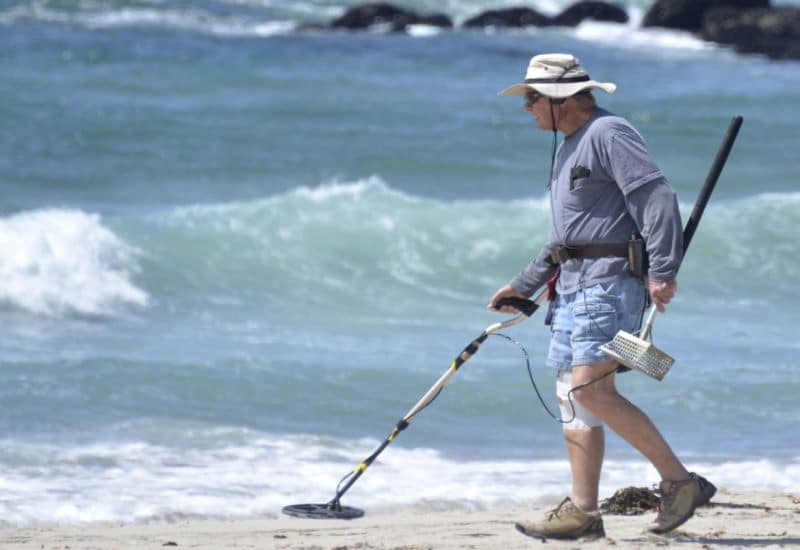
A lot of people love spending time on the beach. Whether they like to have a beach picnic or a leisurely swim, the fact that people flock to this location also means that this is a good hunting ground for those in search of hidden treasures. This explains why metal detector hobbyists flock to the beach. In fact, this has inspired that iconic image of a guy sweeping the shoreline with a metal detector with his headphones on. If you are keen to collect metal detector finds on the beach, head to the nearest one you can find and you’ll be in for a surprise with what you might discover.
Why Choose the Beach?
For those who are new to this hobby, it might be surprising why hobbyists choose to search for treasures on the beach. However, there is a valid explanation for this.
According to experts, Mother Nature will deposit items of the same weight back into the same location. For example, items such as coins, jewelry, and other small treasures will be deposited on the beach’s high watermark line. If you uncover an object of value, it is very likely that you could find a few other objects around the same area.
Metal Detector Finds on the Beach: Tips and Strategies
Would you like to get more metal detector finds on the beach? There are a few tips and strategies that you can use to get more treasures on your hunting trip. Make sure to follow these strategies:
- To maximize your metal detector finds on the beach, make sure you take your time. Slowly walk from one end of the beach to the other, carefully swaying your search coil from one side to the other.
- Make sure you have the right metal detector for the beach. There are several minerals that can affect the ability of your device to detect the buried treasures. Your detector should be able to discriminate from the junk and find only real treasures.
- Understand how the tide works. Tides also change all the time based on the weather and seasons. It can bring treasure into the beach and then draw them back into the water. Always practice safety when hunting treasures with the tides. The low tide is the best time to look for treasures because the items are often easily visible or easier to find with your metal detector.
- When treasure hunting, work in a methodical and specific pattern. You can even divide the beach into a grid and work one section at a time. This methodical approach will ensure that you cover the entire area and that you do not miss anything (or end up going back to the same spot you already swept).
- If you identify a highly productive area, mark that grid by scooping out sand. This will help signal that you can focus on that particular area. As mentioned above, if you find anything in a given area, there is a high possibility that you can find more items of value. If you uncover trash or any junk, don’t give up. Sometimes, these junks are buried on the top surface and the real treasure is buried much deeper.
- Follow the towel line. This is a famous area for beach metal detectors because this is where beachgoers spend most of their time in. This is the area just above the tide line.

Metal Detector Finds on the Beach: Finding a Good Location
When it comes to finding buried treasures like gold or coins, is any beach good enough? It’s no secret that beaches are popular for treasure hunters but if you want to have a successful treasure hunting experience, you need to set yourself up for success by choosing the right beach.
The simplest way to find the best location is to choose a popular beach. The more people there are on a beach, the more treasures you can find. People tend to drop items of value such as rings, coins, or gold items while they are on the beach. This is your opportunity to find these treasures that people have left behind.
Do not dismiss private beaches or those that have undergone seashore development. The process of natural erosion or tidal activity can cause objects to redeposit. Take the opportunity to scour these beaches and you might unlock valuable items during your hunt.
When searching for a beach that you can take your metal detector to, always check if you need permission to hunt the grounds. Most public beaches do not require permission while some require a simple permit from the local government office. Private beaches, obviously, are off-limits unless it is your own private beach or someone you personally know.

Tips for Finding the Best Metal Detectors
Choosing the right metal detector is integral to the success of your treasure hunting trip on the beach. If you’ve shopped around for metal detectors to use, you will find that they are not all made equal. Some are designed with specific features that are suited for certain treasure hunting locations. It is true for beach treasure hunting.
The first thing to consider when choosing a beach metal detector is the type of water in the area. Is it surrounded by fresh or saltwater? A saltwater beach has a different level of mineralization than a freshwater beach. You need different types of detectors that can handle this varying mineralization level for more accurate detecting.
The best metal detectors for the beach are the ones that can wade into shallow water. For this reason, you might want to invest in underwater metal detectors. The ones with VLF technology are excellent for freshwater or dry beaches. Plus, they are affordable too. There are also VLF metal detectors that are suited for saltwater beaches because they offer the ability to adjust ground balance.
Meanwhile, those who will be hunting saltwater beaches will have better results with pulse induction (PI) detectors. This technology enables metal detectors to ignore the salt content and has the ability to detect deeper targets. It also has the ability to ignore junk, which there can be many of on the beach.













